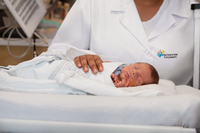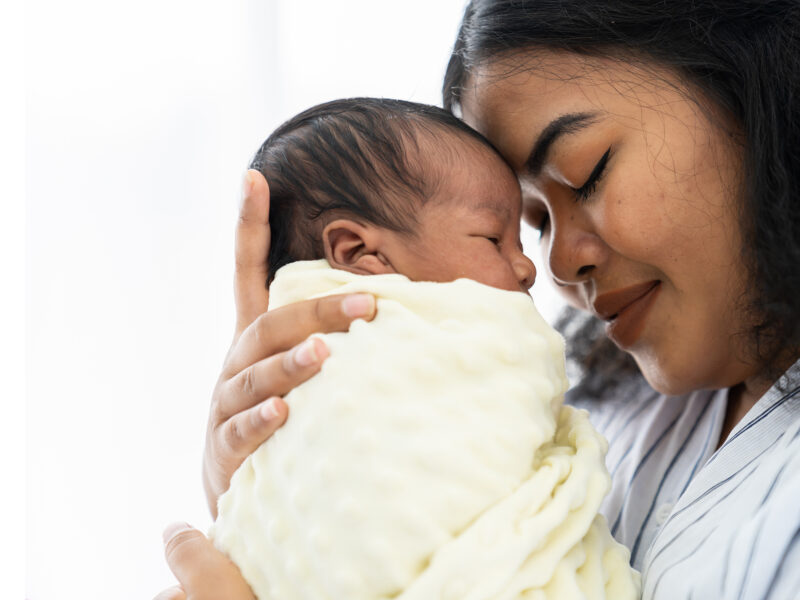Multi-Disciplinary Team Develops Evidence-Based Guidelines for Acute Management of Persistent Pulmonary Hypertension in Newborns
Multi-Disciplinary Team Develops Evidence-Based Guidelines for Acute Management of Persistent Pulmonary Hypertension in Newborns https://pediatricsnationwide.org/wp-content/uploads/2022/04/013019BS2257_c.jpeg 200 133 Katie Brind'Amour, PhD, MS, CHES Katie Brind'Amour, PhD, MS, CHES https://pediatricsnationwide.org/wp-content/uploads/2021/03/Katie-B-portrait.gif
What began as an internal effort to simplify practice has transformed into published evidence-based guidelines to standardize care for acute stabilization and management of newborns with pulmonary hypertension.
Persistent pulmonary hypertension of the newborn (PPHN) is a highly varied and changeable condition that presents a challenge for clinical management, even among tertiary care centers with PPHN specialists. Targeting treatment to the underlying etiology and pathophysiology is critical to timely, effective stabilization of this notoriously clinically labile disease.
To simplify care internally and reduce the risk of clinical deterioration among patients, a multi-disciplinary team at Nationwide Children’s Hospital reviewed the literature for practice guidance to incorporate into their clinical care. Now, they’ve published their full list of evidence-based guidelines for acute PPHN stabilization and management, with more guidelines to come covering longer-term treatment recommendations.
“I think there are two key takeaways from the literature,” says Molly Ball, MD, attending neonatologist at Nationwide Children’s and lead author on the guidelines, published in the American Journal of Perinatology. “Number one, step back to think through the underlying pathophysiology of the disease for every single patient.”
The guidelines offer specific strategies for differential diagnoses and assessments to perform to determine the correct path forward based on various clinical signs.
“Number two, don’t underestimate the importance of standardizing your practice with approaches based on clinical feedback from continuous monitoring,” Dr. Ball says. “Kids with pulmonary hypertension can change quickly, so constant reevaluation based on the latest clinical information is crucial to determining when it is time to wean, stabilize or escalate.”
The current set of guidelines offer practice advice for the first few days of PPHN care, which should support clinicians in during early stabilization efforts. Dr. Ball and the neonatologists, cardiologists and other subspecialties forming the hospital’s Pulmonary Hypertension Group are also planning to publish evidence-based care guidelines for subacute and chronic PPHN, to cover the full spectrum of PPHN care.
“I hope the guidelines empower clinicians with the tools they need to feel more comfortable managing some of the sickest kids in the NICU,” Dr. Ball says. “And I hope that utilizing the evidence and minimizing practice variability translates to improved clinical outcomes — less ECMO [extracorporeal membrane oxygenation] and less morbidity and mortality, with healthier children — in the long run.”
The team is also developing manuscripts covering outcomes pre- and post-implementation of the guidelines at Nationwide Children’s, as well as research examining the effectiveness and outcomes of pulmonary vasodilator and ECMO use in PPHN.
Reference:
Ball MK, Seabrook RB, Bonachea EM, Chen B, Fathi O, Nankervis CA, Osman A, Schlegel AB, Magers J, Kulpa T, Sharpin P, Snyder ML, Gajarski RJ, Nandi D, Backes CH. Evidence-based guidelines for acute stabilization and management of neonates with persistent pulmonary hypertension of the newborn. American Journal of Perinatology. 2021 Dec 1. Epub ahead of print.
Image credit: Nationwide Children’s Hospital
About the author
Katherine (Katie) Brind’Amour is a freelance medical and health science writer based in Pennsylvania. She has written about nearly every therapeutic area for patients, doctors and the general public. Dr. Brind’Amour specializes in health literacy and patient education. She completed her BS and MS degrees in Biology at Arizona State University and her PhD in Health Services Management and Policy at The Ohio State University. She is a Certified Health Education Specialist and is interested in health promotion via health programs and the communication of medical information.
- Katie Brind'Amour, PhD, MS, CHEShttps://pediatricsnationwide.org/author/katie-brindamour-phd-ms-ches/April 27, 2014
- Katie Brind'Amour, PhD, MS, CHEShttps://pediatricsnationwide.org/author/katie-brindamour-phd-ms-ches/April 27, 2014
- Katie Brind'Amour, PhD, MS, CHEShttps://pediatricsnationwide.org/author/katie-brindamour-phd-ms-ches/April 27, 2014
- Katie Brind'Amour, PhD, MS, CHEShttps://pediatricsnationwide.org/author/katie-brindamour-phd-ms-ches/April 28, 2014
- Posted In:
- Clinical Updates
- In Brief







